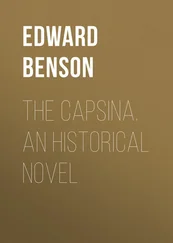Edward Benson - The Relentless City
Здесь есть возможность читать онлайн «Edward Benson - The Relentless City» — ознакомительный отрывок электронной книги совершенно бесплатно, а после прочтения отрывка купить полную версию. В некоторых случаях можно слушать аудио, скачать через торрент в формате fb2 и присутствует краткое содержание. Жанр: foreign_prose, на английском языке. Описание произведения, (предисловие) а так же отзывы посетителей доступны на портале библиотеки ЛибКат.
- Название:The Relentless City
- Автор:
- Жанр:
- Год:неизвестен
- ISBN:нет данных
- Рейтинг книги:3 / 5. Голосов: 1
-
Избранное:Добавить в избранное
- Отзывы:
-
Ваша оценка:
- 60
- 1
- 2
- 3
- 4
- 5
The Relentless City: краткое содержание, описание и аннотация
Предлагаем к чтению аннотацию, описание, краткое содержание или предисловие (зависит от того, что написал сам автор книги «The Relentless City»). Если вы не нашли необходимую информацию о книге — напишите в комментариях, мы постараемся отыскать её.
The Relentless City — читать онлайн ознакомительный отрывок
Ниже представлен текст книги, разбитый по страницам. Система сохранения места последней прочитанной страницы, позволяет с удобством читать онлайн бесплатно книгу «The Relentless City», без необходимости каждый раз заново искать на чём Вы остановились. Поставьте закладку, и сможете в любой момент перейти на страницу, на которой закончили чтение.
Интервал:
Закладка:
'I don't wish,' said he. 'It wasn't true then, and I don't suppose it will be by now. You mean that Bertie saw a good deal of her at one time, but how much neither you nor I know.'
Sybil turned, and began walking home again rather quickly.
'How disgusting!' she said.
'Your fault,' he said – ' entirely your fault.'
'But won't it be rather awkward for him?' she asked, walking rather more slowly.
'I asked him that the other night,' said Charlie; 'he said he didn't know.'
Again for a time they walked in silence. But the alertness of Mrs. Massington's face went bail for the fact that she was not silent because she had nothing to say. Then it is to be supposed that she followed out the train of her thought to her own satisfaction.
'How lovely the shadows are!' she remarked; 'shadows are so much more attractive than lights.'
'Searchlights?' asked he.
'No; shadows and searchlights belong to the same plane. I hope it is tea-time; I am so hungry.'
This was irrelevant enough; irrelevance, therefore, was no longer a social crime.
'And I should like to see my double,' said Charlie.
The only drawback to the charming situation of the house was that a curve of a branch railway-line to Winchester passed not far from the garden. Trains were infrequent on it on weekdays, even more infrequent on Sundays. But at this moment the thump of an approaching train was heard, climbing up the incline of the line.
'Brut-al-it-é, brut-al-it-é, brut-al-it-é,' said the labouring engine.
She turned to him.
'Even here,' she said – 'even here is an elbow, a sharp elbow. "Utility, utility!" Did you not hear the engine say that?'
'Something of this sort,' said he.
CHAPTER IV
A day of appalling heat and airlessness was drawing to its close, and the unloveliest city in the world was beginning to find it just possible to breathe again. For fourteen hours New York had been grilling beneath a September sun in an anticyclone; and though anticyclone is a word that does not seem to matter much when it occurs in an obscure corner of the Herald , under the heading of 'Weather Report,' yet, when it is translated from this fairy-land of print into actual life, it matters a good deal if the place is New York and the month is September. Other papers talked airily of a 'heat wave,' and up in Newport everyone reflected with some gusto how unbearable it must be in town, and went to their balls and dinner-parties and picnics and bridge with the added zest that the sauce of these reflections gave. Even in Newport the heat was almost oppressive, but to think of New York made it seem cooler.
From the corner where Sixth Avenue slices across Broadway and Thirty-fourth Street crosses both, one can see the huge mass of the Waldorf Hotel rising gigantic against the evening sky, and wonder, if one is that way inclined, how many million dollars it has taken to blot out the evening sun. But during the afternoon to-day most people were probably grateful for the shadow which those millions had undesignedly procured them; it was something as one went from Fifth Avenue to Broadway to be shielded a little by that hideous immensity, for the dazzle and glare of the sun had been beyond all telling. And though now the sun was close to its setting, the airlessness and acrid heat of the evening was scarcely more tolerable than the furnace heat of the day, for boiling was not appreciably more pleasant than baking. Yet in the relentless city, where no one may pause for a moment unless he wishes to be left behind in the great universal race for gold, which begins as soon as a child can walk, and ceases not until he is long past walking, the climbings of the thermometer into the nineties is an acrobatic feat which concerns the thermometer only, and at the junction of Sixth Avenue and Broadway there was no slackening in the tides of the affairs of men. The electric street cars which ran up and down both these streets, and the cars that crossed them, running east and west up Thirty-fourth Street, were all full to overflowing, and passengers hung on to straps and steps as swarming bees cluster around their queen. Those in the centre of the car were unable to get out where they wanted, while those at the ends who could get out did not want to. A mass of damp human heat, patient, tired, nasal-voiced, and busy, made ingress and egress impossible, and that on which serene philosophers would gaze, saying, 'How beautiful is democracy!' appeared to those who took part in it to be merely mis-management. Incessant ringings of the conductor's bell, the sudden jerks of stoppages and startings, joltings over points where the lights were suddenly extinguished, punctuated the passage of the cars up and down the street, and still the swarming crowds clustered and hung on to straps and backs of seats wherever they could find foot-hold and standing room. But all alike, in payment for this demoniacal means of locomotion, put their five cents into the hot and grimy hands of the conductor, from which, by occult and subtle processes, they were gradually transformed into the decorations of the yachts and palaces of the owners of the line.
Democracy and discomfort, too, held equal sway in the crowded trams of the elevated railway which roared by overhead down Sixth Avenue, in the carriages of which tired millionaires and tired milliners sat stewing side by side, with screeching whistles, grinding brakes, and the vomiting forth of the foul smoke from soft coal; for a strike of some kind was in progress in Pennsylvania, and the men who had stored coal and also engineered the strike were reaping a million dollars a day in increased prices and slight inconvenience to a hundred million people, for the thick pungent smoke poured in wreaths into the first-floor windows of the dingy, dirty habitations of the street. But the train passed by on the trembling and jarring trestles, and the inconvenience passed also, till the next train came.
Thunder of the passing trains above; rumbling of the electric cars; roar of heavy, iron-shod wheels of drays on the uneven, ill-paved cobbles of the street; jostling of the foot passengers on the side-walks, as they streamed in and out from the rickety wooden staircases of the elevated railway, from the crammed, perspiring cars, from dingy, sour-smelling restaurants; shouts of the newsboys with sheaves of ill-printed newspapers under their arms, giving horrible details of the latest murder, and abominable prints of the victim's false teeth, shoes, and the dress she had last been seen in; the thump-thump of the engines in the Herald office; the sickening stew of the streets; the sickening heat of the skies – Democracy, or 'Everyone for himself.'
As an antidote or warning – though it did not seem to have the least effect on the dogged, unending bustle – the note of 'Impermanence' was everywhere sounded loudly. A block or two further up, for instance, the street was torn up for some new underground enterprise (Lewis S. Palmer, as a matter of fact, had floated a company to run a new subterranean line across New York, and had been paid a million and a half dollars for the loan of his credit); and while the cars, which will certainly not cease running till the last trump has been sounded several times, passed over spindle-shanked iron girders and supports, shaken every now and again by the blasting of the rock below, thousands of workmen were toiling day and night deep down in the earth, loading the baskets of the cranes with the splinters of the riven rocks, or giving the larger pieces into the embrace of huge iron pincers that tackled them as a spider tackles a fat fly, and, rising aloft with them above street level, took them along the ropes of their iron web, over the heads of passengers and vehicles, for the carts which waited for them. Elsewhere, half a block of building had vanished almost as the night to make way for something taller, and where yesterday a five-storied building had stood, the site to-day was vacant but for a dozen pistons half buried in the ground, which puffed and shook in a sort of hellish ecstasy of glee at the work, while a gang of men with axe and pick dug out the foundations for the steel house-frames. Yet though to-morrow almost would see the newly completed building again filling up the gap in the street, the exposed walls of the adjacent houses were just for to-day only covered with advertisements, and a notice informed the bewildered shopper that business was going on as usual. That in New York might be taken for granted, but the notice omitted to say where it was going on. But for the crowd in general it was sufficient that work was to be done, and money to be made. That was the whole business and duty of each unit there, and as far as each unit was concerned, the devil might take the rest. Everyone looked tired, worn out, but indefatigable, and extraordinarily patient. One man pushed roughly by another, and where in England the one would look aggrieved, and the other probably, however insincerely, mutter an apology, here neither grievance nor apology was felt, desired, or expressed, for it is a waste of time to feel aggrieved and a waste of energy to express or feel regret. To-morrow the crowd would, on the average, be a little richer than to-day; that was all they wanted. To-morrow the world in general would be a day richer.
Читать дальшеИнтервал:
Закладка:
Похожие книги на «The Relentless City»
Представляем Вашему вниманию похожие книги на «The Relentless City» списком для выбора. Мы отобрали схожую по названию и смыслу литературу в надежде предоставить читателям больше вариантов отыскать новые, интересные, ещё непрочитанные произведения.
Обсуждение, отзывы о книге «The Relentless City» и просто собственные мнения читателей. Оставьте ваши комментарии, напишите, что Вы думаете о произведении, его смысле или главных героях. Укажите что конкретно понравилось, а что нет, и почему Вы так считаете.











